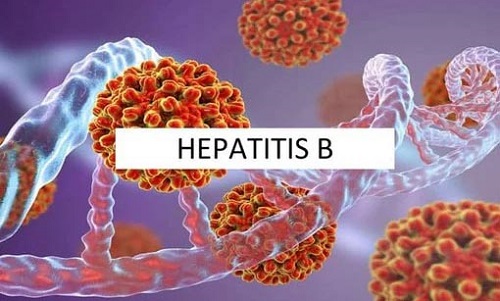Derivative of the phytochemical Rupestonic Acid shows promise in Hepatitis B treatment
Nikhil Prasad Fact checked by:Thailand Medical News Team Jul 19, 2024 1 year, 6 months, 2 days, 15 hours, 26 minutes ago
Medical News: In an exciting development for Hepatitis B treatment, researchers from the Chinese Academy of Sciences and Xinjiang Technical Institute-China have discovered a promising new compound. Their study highlights the potential of YZH-106, a derivative of rupestonic acid, in reducing Hepatitis B surface antigen (HBsAg) levels. Rupestonic acid, is a phytochemical sesquiterpene extracted from Artemisia rupestris L. This
Medical News report explores the implications of this breakthrough for managing chronic Hepatitis B infections.
 Derivative of the phytochemical Rupestonic Acid shows promise in Hepatitis B treatment
Understanding Hepatitis B and HBsAg
Derivative of the phytochemical Rupestonic Acid shows promise in Hepatitis B treatment
Understanding Hepatitis B and HBsAg
Hepatitis B, a severe liver infection caused by the Hepatitis B virus (HBV), affects about 250 million people worldwide. Chronic HBV infection is characterized by the persistent presence of HBsAg, a protein that not only indicates infection but also plays a role in immune system evasion, contributing to the disease's chronic nature. HBsAg proteins come in three forms: small (S-HBsAg), middle (M-HBsAg), and large (L-HBsAg), all of which are essential for the virus's life cycle. Targeting these proteins is a key strategy in combating HBV.
The Role of HBsAg in Chronic Hepatitis B
HBsAg is not only a biomarker for HBV infection but also plays a critical role in the persistence of the virus. It contributes to immune system evasion by interacting with various immune cells, leading to their dysfunction and exhaustion. This is why achieving HBsAg loss is a significant goal in HBV treatment, as it can lead to a functional cure where the virus is controlled and its impact on the liver minimized.
Current Treatment Limitations
Current treatments for chronic Hepatitis B include PEG-interferon and nucleos(t)ide analogues (NAs). While these treatments can reduce viral load and improve liver function, they often fall short of achieving sustained HBsAg loss. This is where YZH-106 presents a new hope, offering a different mechanism of action that directly targets the viral proteins essential for HBV replication and persistence.
YZH-106: A New Approach
Mechanism of Action
YZH-106 promotes the degradation of the viral L- and M-HBsAg proteins via lysosomes, cellular structures that break down waste materials. By binding directly to the PreS2 domain of these proteins, YZH-106 blocks their entry into the endoplasmic reticulum (ER), a cellular organelle essential for protein processing. This blockage leads to the proteins' accumulation in the cytoplasm and their subsequent degradation.
Detailed Study Findings
The study conducted by the researchers involved several key experiments and findings:
-Inhibition of HBsAg Secretion: YZH-106 was shown to significantly reduce HBsAg levels in HepG2.2.15 cells, a cell line commonly used in HBV studies. Additionally, th
e compound was effective in reducing HBsAg levels in HBV-infected HepG2-NTCP cells. This reduction was dose-dependent, meaning the higher the concentration of YZH-106, the greater the decrease in HBsAg.
-Impact on Viral DNA: Alongside the reduction in HBsAg, the study also observed a decrease in HBV DNA levels in the cell supernatant. This suggests that YZH-106 not only affects the viral proteins but also impacts the overall viral replication process.
-Selective Degradation: One of the notable findings was that YZH-106 specifically targets the L- and M-HBsAg for degradation without significantly affecting the S-HBsAg. This selective action could potentially minimize side effects and make the treatment more efficient.
Mechanism Confirmed by Western Blot and Fluorescence Microscopy: Western blot analysis and fluorescence microscopy confirmed that YZH-106 promotes the lysosomal degradation of L- and M-HBsAg. The co-localization of these proteins with lysosomal markers was significantly increased upon treatment with YZH-106, providing strong evidence of its mechanism of action.
Potential for Clinical Application
The promising results from the in vitro studies pave the way for further research to optimize YZH-106's structure to enhance its binding affinity and specificity. However, before it can be considered for clinical use, extensive animal studies and clinical trials are necessary to evaluate its effectiveness and safety in humans.
Implications for Future HBV Treatments
If proven effective in clinical trials, YZH-106 could revolutionize the treatment of chronic Hepatitis B. Its unique mechanism of action, targeting and degrading specific viral proteins, offers a new therapeutic pathway that differs from current treatments. This could lead to more effective management of HBV and potentially higher rates of functional cure.
Conclusion
The findings from this study provide a strong foundation for developing YZH-106 as a potential therapeutic agent against HBV. Its novel mechanism of action - promoting the lysosomal degradation of key viral proteins - offers hope for a more effective treatment strategy for chronic Hepatitis B patients.
The study findings were published in the peer-reviewed journal: Viruses.
https://www.mdpi.com/1999-4915/16/7/1151
For the latest on HBV, keep logging into Thailand
Medical News.
Read Also:
https://www.thailandmedical.news/news/antihistamines-and-liver-cancer-unveiling-hidden-risks-in-hepatitis-patients
https://www.thailandmedical.news/news/breaking-study-finds-that-hepatitis-e-virus-infects-and-replicates-in-men-s-testicles-and-sertoli-cells
